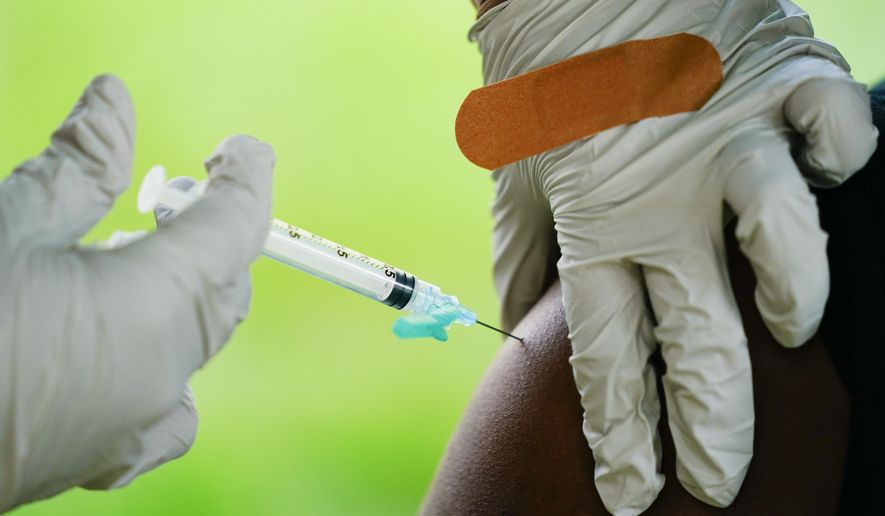Federal agencies could authorize COVID-19 booster shots for all adults before the weekend, a fast turnaround that bypasses a key advisory committee.
The Food and Drug Administration is not expected to consult with an outside advisory group that pumped the brakes on President Biden’s push for widespread boosters about two months ago.
“I’m disappointed that our committee didn’t get a chance to review this recommendation,” Dr. Paul Offit, a pediatrics professor at the University of Pennsylvania and member of the advisory panel, told The Washington Times. “I think it would have been valuable to the public to be able to hear our deliberations on this. Will be curious to hear the ACIP discussion on Friday.”
Members of the group have generally supported boosters for older persons and the medically frail but have taken a harder line on boosters for young people, saying the shots appear to be holding up on preventing hospitalization and death, and they need to analyze the risk of myocarditis, or inflammation of the heart muscle, that sometimes occurs after vaccination — particularly in teenage or young adult males.
The short-cut approval process comes a little more than a week after Pfizer and BioNTech submitted their request to the Food and Drug Administration.
FDA regulators are now looking to act by Thursday, according to The New York Times, and the Centers for Disease Control and Prevention has scheduled a three-hour meeting of its Advisory Committee on Immunization Practices (ACIP) to discuss boosters Friday.
In a statement, the FDA did not commit to a deadline for authorization but said the prior meeting of the advisory panel — the Vaccines and Related Biological Products Advisory Committee (VRBPAC) — was sufficient.
“The agency has previously convened the VRBPAC for extensive discussions regarding the use of boosters for COVID-19 vaccines and, after review of the request, we have concluded that it does not raise questions that would benefit from additional discussion by the members of the committee,” FDA spokeswoman Alison Hunt said. “While the FDA cannot predict how long its evaluation of the data and information will take, the agency will review the request as expeditiously as possible.”
The Biden administration is pushing for extra doses amid signs the vaccines’ power wanes after six months, and as cases tick up on the cusp of the holiday season.
Signoff from the FDA and CDC would open the floodgates to extra vaccine doses to all adults. Right now, subgroups who received the Pfizer or Moderna shots at least six months ago can come forward for an extra dose, and all recipients of the Johnson & Johnson vaccine at least two months ago can seek a booster.
States were starting to get ahead of the feds, however. New York City on Monday told health providers not to turn people away if they seek a booster, and Arkansas, California, Colorado and New Mexico opened the doors to all adults.
The two-dose vaccine from Pfizer was the first to be cleared for emergency use at the end of 2020.
SEE ALSO: White House: 10% of kids have been vaccinated in 1st 2 weeks
Now, the drugmaker wants to offer third doses to all adults based on new trial data from 10,000 participants in the U.S., Brazil and South Africa with a median age of 53 and who completed a two-dose series with the Pfizer vaccine.
During the study, there were five cases of symptomatic COVID-19 disease in the booster group and 109 cases in the non-booster group, for a relative efficacy of 95%.
“The FDA is actively reviewing data and we are in close touch with them,” CDC Director Rochelle Walensky said at a White House COVID-19 briefing Wednesday. “As soon as the FDA reviews those data and provides an authorization, we at CDC will act swiftly.”
Despite the booster push, Dr. Walensky said the definition of what it means to be fully vaccinated is not changing. It is still two doses of the Pfizer-BioNTech or Moderna vaccines or one dose of the J&J vaccine.
Dr. Anthony Fauci, director of the National Institute of Allergy and Infectious Diseases, said he realizes the elderly and medically frail have a bigger need for extra doses but he thinks a widespread boost is worthwhile.
“Obviously, young individuals have much less of a likelihood of progressing to severe disease than elderly individuals and adults,” Dr. Fauci said, though he added that younger persons do suffer symptoms and could develop “long COVID.”
“So there is a really good reason to optimally protect younger individuals,” he said.
• Tom Howell Jr. can be reached at thowell@washingtontimes.com.




Please read our comment policy before commenting.